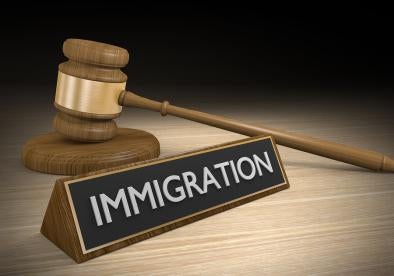Supreme Court Tied on Expansion of Obama Deferred Deportation Orders
The U.S. Supreme Court’s 4-4 tie in a case appealing a nationwide injunction on the Obama Administration’s plans to expand the Deferred Action for Childhood Arrivals (DACA) and create the Deferred Action for Parents of Americans and Lawful Permanent Residents (DAPA) programs means the appeals court ruling stands. United States v. Texas, No. 15-674 (June 23, 2016), reh’g denied (Oct. 3, 2016). Under DACA, certain undocumented immigrants who arrived as minors were able to defer deportation and receive employment authorization. DAPA would have allowed parents of U.S. citizens or lawful permanent residents (green card holders) to apply for deferred deportation and employment authorization.
Higher Penalties for Hiring Unauthorized Workers
Employers face substantially increased civil monetary penalties for knowingly employing an unauthorized worker and for certain other immigration-related violations under a U.S. Department of Justice interim rule that took effect on August 1, 2016, and applying to violations occurring after November 2, 2015. The minimum penalty for a first offense of knowingly employing an unauthorized worker will increase from $375 to $539 per worker, and the maximum penalty will increase from $3,200 to $4,313 per worker. The largest increase raises the maximum civil penalty for multiple violations from $16,000 to $21,563 per worker. Paperwork violations can be assessed a maximum penalty of $2,156 per relevant individual, up from $1,100. Finally, for unfair immigration-related employment practices, the maximum penalty increases from $3,200 to $3,563 per person discriminated against.
DUI Arrest May Mean Revocation of Visa
Individuals may lose their nonimmigrant visas if arrested for Driving Under the Influence (DUI) or related offenses, new guidance from the Department of State advises. DOS can “prudentially revoke” an otherwise valid nonimmigrant visa immediately upon notification by local law enforcement of the DUI arrest, even while the individual is in the United States, based on the suspicion the individual is ineligible for a visa on physical or mental health-related grounds. Unlike other grounds for inadmissibility or ineligibility for a visa, a determination of guilt is not required.
Administration Welcomes Foreign Entrepreneurs with Proposed Rule
The Department of Homeland Security has proposed a new “International Entrepreneur Rule” allowing certain founders of start-up companies from abroad to come to the U.S. for an initial stay to build their business. They would have two years (extendable to five years) to establish and grow a business with a relatively low financial commitment ($345,000 capital requirement, including investment from qualified U.S. persons or government grants of at least $100,000). International entrepreneurs must maintain an active role in the business and at least 15 percent ownership of the enterprise, two requirements not likely to impede most new company founders.
New Form I-9 Update
The Office of Management and Budget has approved revisions to the Form I-9, but the release date has not been announced, although it likely will be this fall. The new form will include much-needed technology features to assist employers in identifying errors. It will replace the 2013 version and will be valid until August 31, 2019. It is unclear how long the earlier version will be accepted once the new form is released. Training and preparation on the new Form I-9 will be vital to minimize the potential for costly fines and penalties.
Flagging Economy Does Not Relieve H-1B Employers of Wage Obligations
Employers employing foreign nationals in H-1B nonimmigrant visa status must pay their H-1B employees the wage specified on the Labor Condition Application (LCA) certified by the Department of Labor, regardless of whether the H-1B employer is enduring difficult economic or financial periods due to a struggling national economy, a DOL Administrative Law Judge has concluded. DOL Wage and Hour Division v. Shriiji Krupa, Inc. H-1B employers must adhere to the attestations made in the LCA governing the employment of their H-1B employees, even in the face of claimed business hardship. Unless the H-1B employee voluntarily reduces work (or leaves the employer’s employ), there is a bona fide termination of employment consistent with DOL regulations, or a new LCA becomes effective, the employer must meet its obligations under the controlling LCA.








 i
i

